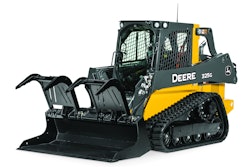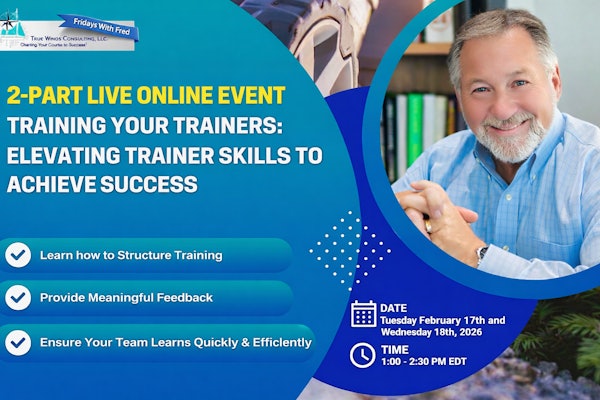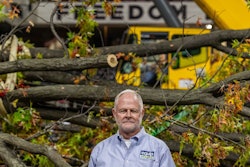 Photo: LandOpt
Photo: LandOptFinding a peer group sounds simple enough. Just reach out to some of your fellow landscaping buddies in different regions and chat every once in a while, right?
Yet if you really want to get the most out of a peer group, you’re going to have to put more effort into it than that, and there are a considerable number of factors you need to account for when trying to find the right group for you.
Selecting the right group
In landscape industry consultant Jeffrey Scott’s book, The Leader’s Edge, he covers the ins and outs of peer groups and how to get the most out of them. Some of the aspects that he lists as important for a good membership mix in a peer group are confidentiality, an achievement focus and diversity.
Once you have finally trusted your peers enough to open up and share confidential information, the last thing you want is for that information to be passed on to those outside the group. Scott says the level of discretion in a group has a lot to do with the facilitator and the tone that is set for the group.
Scott says he vets those who want to join his peer group to ensure he is creating a community of high-quality, ethical peers but also to determine their larger goals and push them towards that.
“Here’s what I look at when I’m talking to somebody: Are they really willing to commit to this process to build the relationships with their peers to do the work throughout the year and to be supportive in helping others and not just looking to help themselves,” Scott says.
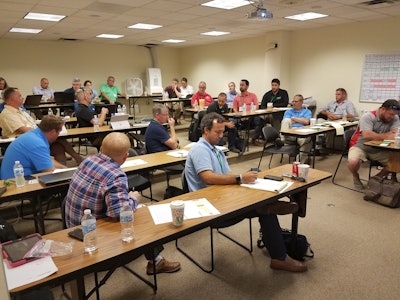 Photo: LandOpt
Photo: LandOptPeer groups that feature an achievement mindset is one where people are open to think outside the box in order to find new methods of productivity. Scott says achievers focus on success and optimism and do not give up on themselves or their peers.
“They should look for a peer group with non-competing companies that have really high-level, good people in those peer groups,” Scott says. “You really have to find your peers and be willing to help each other grow up. The level of achievement-mindedness needs to be very high. You need a leader, like myself, who’s prodding and really pushing everybody out of their comfort zone to look at the bigger opportunities and how to really go to that next level.”
Diversity is also critical to keeping peer groups innovative by having a number of different perspectives present.
“Your peer group members can have different ages, different-sized businesses and different experiences,” Scott writes in his book. “All that is fine, as long as they share the achievement mindset.”
The size, as well, is another factor to consider. While people might think that smaller peer groups are better, Scott says that these tend to fall apart quicker and are more likely to fall into a rut.
“You don’t even notice the rut because with a small group, it turns into friendships and they become a mutually supportive feel-good group,” he says. “But a larger group is where you actually get the accountability.”
Scott defines a small peer group as under six members. He advises landscape professionals to join groups up to twice that size in order to find more solutions for the problems they encounter.
What kind of peers?
Another question you have to ask when trying to decide which peer group to join is if you want your peers to be fellow landscapers or fellow business owners. Both have their benefits and some landscapers choose to be a part of one of each.
When Tony Szczechowski, owner of Pro Edge Lawn Care, based in Holland, Ohio, went to his first peer group meeting, it was simply a gathering of other small business owners through the local chamber of commerce. Later on when he joined the LandOpt network, his peer group became other landscape professionals.
He says depending on what an owner is trying to learn will help them decide which type of peer group they should seek out. Szczechowski says you can gain more business acumen from industry outsiders, while fellow landscapers can provide excellent advice on topics such as techniques, products and equipment.
Fred Peratt, owner of Environmental Enhancements, based in Sterling, Virginia, also sees the value in learning from industry outsiders.
“There’s a lot of information you can get from outside your industry,” he says. “You look through a tunnel when you’re only with landscapers.”
While Paul Fraynd, co-owner of Sun Valley Landscaping, based in Omaha, Nebraska, says he learns more from other landscape professionals, he does say it is easier to connect with other professionals in other trades due to the lack of competition.
“I feel like I learn more from industry landscapers, but I also learn a whole lot from outsiders as well,” says Seth Kehne, owner of Lawn Butler in Knoxville, Tennessee. “They’re apples and oranges. I think they’re both a really good benefit because sometimes you can get caught in seeing things from the ground level when somebody from outside can see it from 30,000 feet.”
Frequency
Every peer group meets at different frequencies, but Scott says that a good peer group should offer a combination of formal meetings and interactions between these gatherings.
Whether the sessions are monthly, quarterly or twice a year, Scott writes in his book it is far more important how much time you spend preparing for the meetings versus how much time you spend in the meetings.
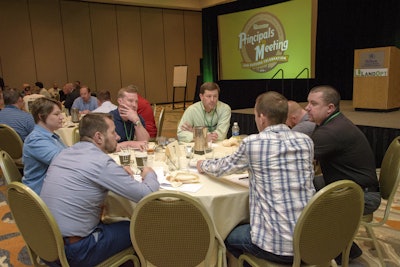 Photo: LandOpt
Photo: LandOptKehne says his peer group will meet twice a year but he catches up with members at GIE+EXPO and others who are within driving distance more throughout the year. He remains in constant contact with the other members as well.
“There probably hasn’t been a week in the last five years that I haven’t either asked a question or been asked a question by someone in the peer group,” Kehne says.
Fraynd has a similar setup, meeting in person twice a year and conducting phone call meetings with his peer group. He, too, stays in close communication with his peer group members.
“That said, not a week goes by when I don’t communicate with members of the group,” Fraynd says. “They are my friends and we share life and business together.”
Peratt also attends two yearly meetings, but he has monthly telephone meetings as well with his peer group.
“I was a little skeptical of the phone peer group meetings, but they work out pretty well,” he says. “They’re about an hour and there’s a set agenda.”
When Szczechowski was attending the peer group through the chamber of commerce, he met with the group monthly, but now he has less face-to-face visits but is often chatting with his peer group frequently, like Kehne and Fraynd.
“When we were doing it monthly back six years ago, it was good for me,” Szczechowski says. “It was the only sounding board I really had at that point. I think as you grow as a business owner and in business, frequency doesn’t matter; the quality of those meetings matter. As long as the quality is there, the frequency is less important.”
The drawbacks
The two main drawbacks to consider when wanting to join a peer group are the time and money required.
Two trips a year may not sound like a lot but Peratt says this can add up quickly, not to mention setting aside the time to do the research to be well-informed for the phone meetings.
“The tougher part is time,” Scott says. “Can you commit to it? Can you travel? Will your family support you being away? You have to be honest with yourself about the time commitment.”
Scott says landscapers should expect to pay under $10,000 to participate in a peer group. He warns in his book that while there are free peer groups available, the long-term value of them is questionable.
“Anybody who thinks it’s about the money doesn’t understand how to make money in their business,” Scott says. “You can’t let the fear get in the way because you’re going to start making money when you come to my group.”
Peratt suggests that smaller landscaping companies should earmark funds to participate in a peer group, as he says the return on investment is phenomenal because you can avoid making costly mistakes when learning from the group.
There is also the risk of peer groups fizzling out after a number of years if new members are not added to keep things fresh.
“It runs its course if there’s no new blood to a peer group,” Szczechowski says. “So, if it’s always the same people, it will, in my opinion, eventually run its course.”
In the end, a peer group will only benefit you when you find the right one for your business. Scott says who you surround yourself with is who you will eventually become, so choose wisely.
“I would also encourage folks to ‘shop’ around,” Fraynd says. “If the group doesn’t feel right, try another one. It’s important to find a fit that is right for you.

